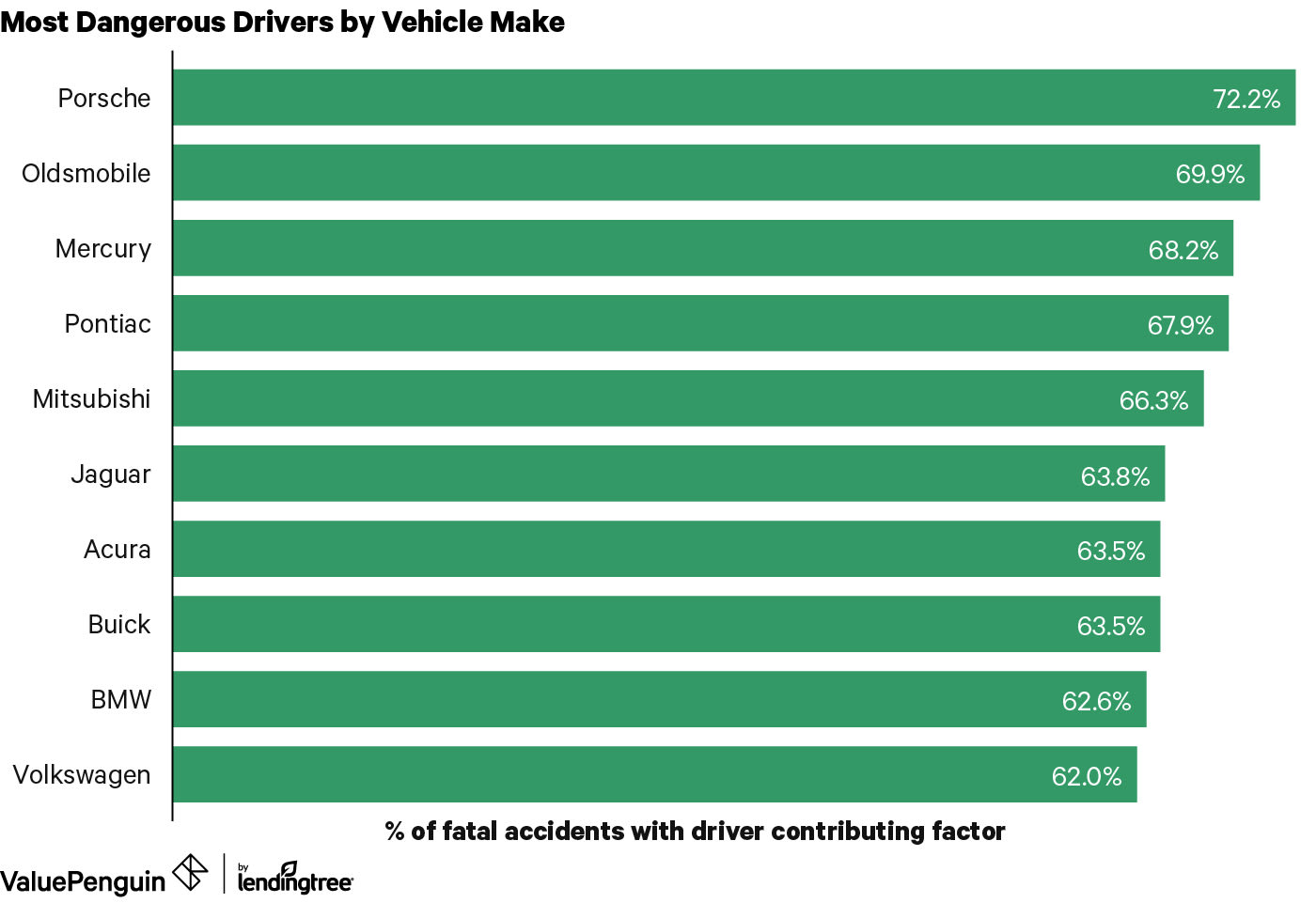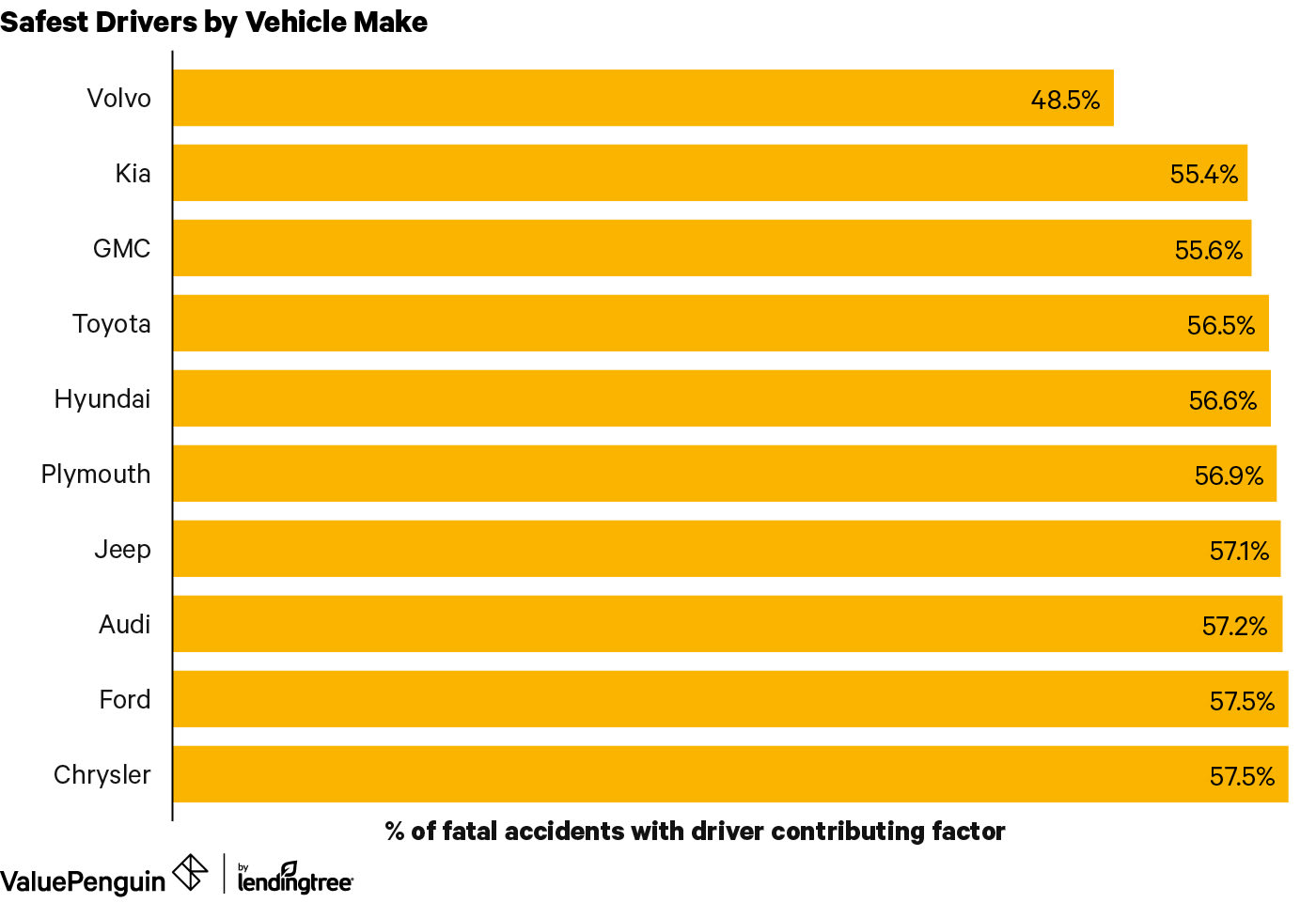Auto Insurance
Which Drivers Are Most Likely to Cause a Fatal Accident?

Key findings:
- Porsche drivers are the most likely to contribute to fatal accidents. Their driving is a contributing factor in 72% of accidents involving these vehicles.
- About 1 in 4 drivers were speeding at the time they were involved in a fatal accident, the most common driver contributing factor.
- Volvo drivers are the least likely to be involved in a fatal accident. Driver behavior is a contributing factor in less than half of these accidents.
Drivers of these cars are the most likely to cause a fatal accident
Of the vehicle makes we surveyed, we found that Porsche drivers were the most likely to contribute to a fatal accident. In more than 70% of the fatal accidents involving these vehicles, driver error was a contributing factor to the accident, whereas the national average is 60%.

Interestingly, while it seems fitting that drivers of high-performance sports cars like Porsches would contribute to accidents, the second- and third-ranked vehicles could not be more different. These cars — the now-defunct GM Oldsmobile and the Ford Mercury — are well-known for practicality rather than sport. In accidents involving these types of cars, driver speeding accounted for just 23% of accidents — which is less than half the rate for Porsche drivers, at 47%.
Behaviors that are the most common cause of fatal accidents
Speeding and drinking alcohol top the list of driver behaviors that lead to fatal car crashes. We found that Porsche and Jaguar drivers are most likely to contribute to the cause of fatal accidents due to these behaviors.
Rank | Driver contributing factors | % of drivers who contributed to fatal accidents | Make most likely to be driven by contributing driver |
|---|---|---|---|
| 1 | Speeding | 25.5% | Porsche |
| 2 | Alcohol involvement | 17.2% | Jaguar |
| 3 | Improper lane usage | 15.2% | Oldsmobile |
| 4 | Failure to yield right-of-way | 15.2% | Oldsmobile |
| 5 | Careless driving | 11.9% | Acura |
Improper lane usage — for example, when a driver veers between lanes or into oncoming traffic — contributed to 15.2% of fatal accidents. This was a common incident with Oldsmobile drivers, who were also the most likely to not yield the right-of-way in a fatal accident.
Drivers of these cars are the least likely to cause a fatal accident
Volvo drivers are the least likely to contribute to fatal traffic accidents, followed by Kia drivers. In more than half of fatal accidents that involved Volvo drivers, their behavior was not a contributing factor. Additionally, Volvo drivers also had a particularly low rate of fatal accidents with alcohol involvement. Alcohol was a contributing factor in only 6.9% of fatal accidents for Volvo drivers, compared to the overall average of 17.2%.

Motorcycles riders are more likely to contribute to fatal accidents than car drivers
Our study found that, on average across the makes we considered, rider error was a contributing factor in 65% of fatal accidents involving motorcycles. This is significantly higher than the average contributing factors for car drivers. While this may indicate that motorcycle riders are very likely to contribute to fatal accidents, the reason may be that crashes involving motorcycles are generally more likely to be catastrophic.
Vehicle type | Average % of fatal accidents w/ driver contributing factor | Make with most dangerous drivers | Most common driver contributing factor |
|---|---|---|---|
| Cars | 60% | Porsche | Improper lane usage |
| Motorcycles | 65% | Kawasaki | Careless driving |
Excluding alcohol involvement and speeding.
Methodology
ValuePenguins collated data from the Fatality Analysis Reporting System ("FARS") from the National Highway Traffic Safety Administration. We calculated the percentage of vehicles involved in fatal accidents where a "driver factor" was recorded, as well as where it was recorded that the driver was speeding and/or had alcohol involvement. "Make Most Likely to Be Driven by Contributing Driver" is the make where that factor made up the largest percentage of fatal accidents involving that make, relative to other makes. Makes involved in fewer than 25 fatal accidents were excluded from aggregation.
